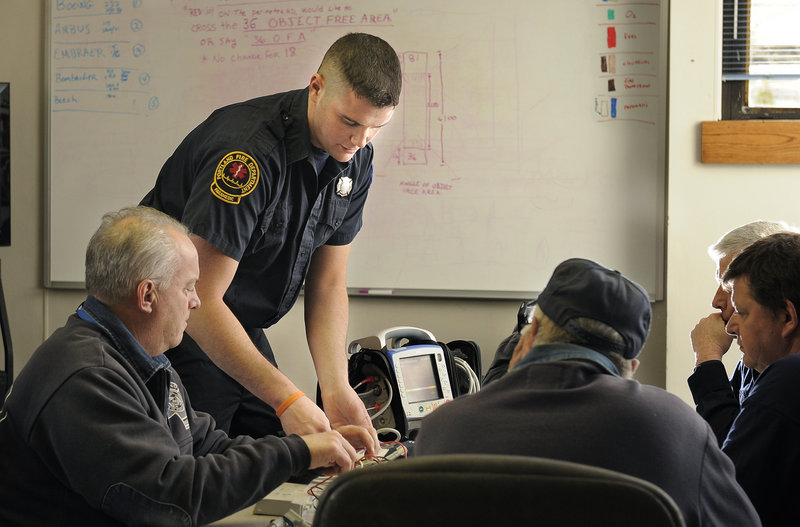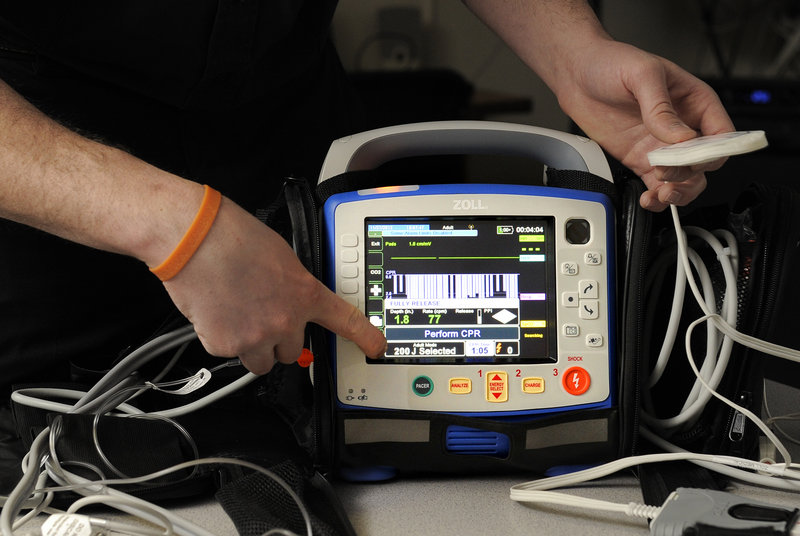Historically, Portland firefighters have only been able to save about 3 percent of heart attack victims.
But improvements in technique and technology are helping emergency medical personnel save significantly more people by increasing the effectiveness of cardiopulmonary resuscitation.
The survival rate for cardiac patients treated and transported by Portland Fire Department’s Medical Crisis Unit workers has jumped to 17 percent so far this year, up from 6 percent last year.
“This represents a tremendous improvement in our system,” said Dr. Matthew Sholl, head of emergency medicine for Maine Medical Center and the fire department’s medical director.
That compares to an average national survival rate of about 6 percent, with individual departments ranging from 2.2 percent to 16.6 percent, he said.
Of the 47 cardiac patients transported since December 2011, eight survived, according to department statistics.
Seven others had a heartbeat when delivered to the hospital but died before being discharged. For the remaining 32, resuscitation efforts were unsuccessful.
The improved survival rate stems from new techniques advocated by the American Heart Association, said Lt. John Kooistra, the department’s quality assurance officer.
Instead of trying to get a patient into the ambulance and to the hospital as quickly as possible, fire and rescue workers now deliver up to 20 minutes of uninterrupted CPR.
That has been shown to improve survival rates by keeping the blood flowing to vital organs, Kooistra said.
Even brief interruptions to move a patient downstairs or into an ambulance have serious consequences.
That has meant a culture change in the fire department, said Deputy Chief Terry Walsh.
“No more loading up the patient and going lights and sirens to the hospital as fast as you can,” Walsh said.
Last month, the department responded to five cardiac arrests and saved two of the patients.
One was an 81-year-old woman and the other a 71-year-old man. In both cases, they were discharged from the hospital after surgery, with little or no neurological damage, he said.
Sholl spoke to a group of firefighters and rescue workers Tuesday at the Stevens Avenue Armory as part of the department’s grand rounds, a monthly exercise where they share lessons learned in major cases from the previous month.
The department also has invested in new technology, devices that monitor the frequency and depth of compressions as CPR is being administered.
If the person delivering CPR doesn’t press down hard enough, the blood doesn’t get pushed to the organs that need it, he said.
If compressions are too rapid, the heart won’t refill with blood. Not rapid enough, and the organs lack adequate oxygen.
The devices not only alert firefighters if CPR is being administered too shallowly or too rapidly, but they also keep a record so the department can review its practice later, Kooistra said.
The department has adopted a “pit crew” approach to make the new protocols work.
A minimum of five and sometimes as many as eight fire and rescue workers will be assigned to a cardiac call.
That way, the people administering CPR can take turns every two minutes so they stay fresh and deliver good compressions, Kooistra said.
“CPR is exhausting. It takes a lot out of you,” Kooistra said. “Making sure you have a fresh set of hands is critical.”
Another firefighter monitors the equipment and directs the care, while others record information and communicate with the hospital.
Officials say the public can also play a role.
“In every success story, we see the public is involved in that either by early activation of 911 or public participation in CPR,” Sholl said.
He said people should be alert for the signs of a heart attack: when someone has collapsed, is unresponsive and has irregular breathing.
Portland is one of the first departments in the area to employ the new techniques and take advantage of new equipment, Kooistra said, but other departments and private ambulance services have been tracking the department’s progress.
Staff Writer David Hench can be contacted at 791-6327 or at:
dhench@pressherald.com
Send questions/comments to the editors.




Success. Please wait for the page to reload. If the page does not reload within 5 seconds, please refresh the page.
Enter your email and password to access comments.
Hi, to comment on stories you must . This profile is in addition to your subscription and website login.
Already have a commenting profile? .
Invalid username/password.
Please check your email to confirm and complete your registration.
Only subscribers are eligible to post comments. Please subscribe or login first for digital access. Here’s why.
Use the form below to reset your password. When you've submitted your account email, we will send an email with a reset code.